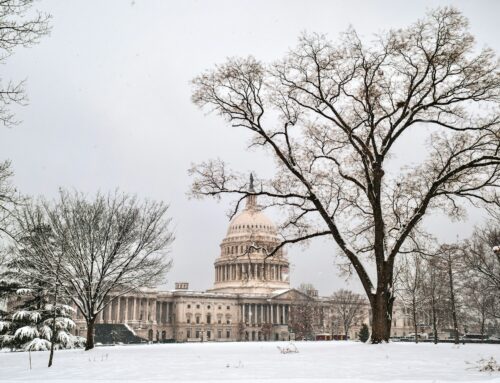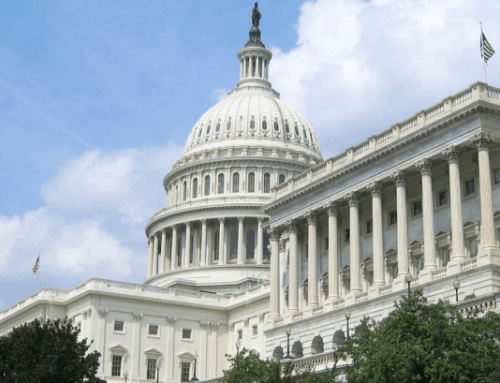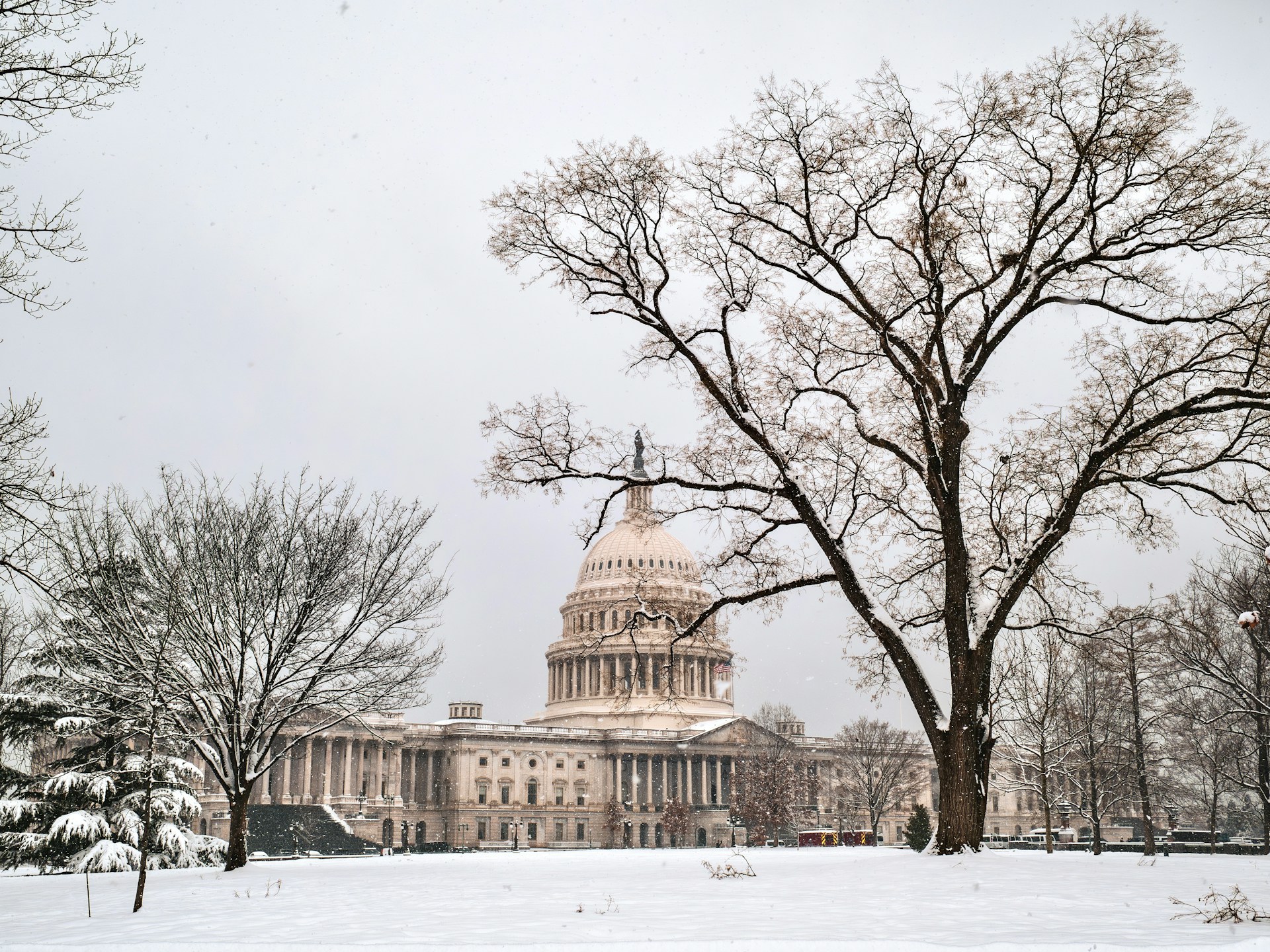In the midst of a full government shutdown, the Trump administration has taken an unprecedented step: firing thousands of federal workers while government funding remains frozen. The problem? This might violate the Anti-Deficiency Act, a law on the books since 1884 that prevents the government from spending money it doesn’t have. TCS President Steve Ellis and Director of Research and Policy Josh Sewell break down why conducting reductions-in-force during a shutdown—which trigger severance payments, administrative costs, and legal battles—could be illegal, and why shifting Pentagon funds to pay military salaries sets a dangerous precedent. Whether you think the federal workforce needs trimming or not, the Constitution is clear: Congress controls the purse strings, not the President, and taxpayers shouldn’t foot the bill for costly legal battles over executive overreach.
Transcript
Announcer:
Welcome to Budget Watchdog All Federal, the podcast dedicated to making sense of the budget spending and tax issues facing the nation. Cut through the partisan rhetoric and talking points for the facts about what’s being talked about, bandied about and pushed to Washington, brought to you by Taxpayers for Common Sense. And now the host of Budget Watchdog AF TCS President Steve Ellis.
Steve Ellis (00:40):
Welcome to All American Taxpayers Seeking Common Sense. You’ve made it to the right place for 30 years. TCS, that’s taxpayers for common sense, has served as an independent nonpartisan budget watchdog group based in Washington dc We believe in fiscal policy for America that is based on facts. We believe in transparency and accountability because no matter where you are in the political spectrum, no one wants to see their tax dollars wasted. It’s October 17th, 2025, and we’re in the midst of a government shutdown, but this time there’s a new twist that goes beyond the typical furloughs and closed national parks. The Trump administration is both proposing and has fired thousands of federal workers outright during the shutdown. The problem, this may be illegal under a law that’s been on the books for over a century. Joining me today to break down why mass firings during a shutdown could violate federal law and what it means for taxpayers is our very own director of research and policy. Josh Sewell. Welcome back. Josh.
Josh Sewell (01:35):
Hey, thanks Steve. Always great to be here.
Steve Ellis (01:37):
So Josh, we’ve talked about government shutdowns before, but this proposal and what they’ve actually done firing thousands of career federal employees during the shutdown is something new. Before we get into why this might be illegal, can you remind our listeners what actually triggers a government shutdown in the first place?
Josh Sewell (01:54):
Yeah, of course. So really, it’s a simple principle. The government cannot spend money. It doesn’t have people who work for the government must have permission or as authorization to spend federal dollars. And that permission typically comes from Congress appropriating funds in the annual budget process. If Congress fails to pass an appropriations bill, agencies must lock their doors. Federal workers cannot work.
Steve Ellis (02:19):
It’s not even that they can’t volunteer their services, they can’t open their laptops, they can’t check their emails, can’t work from home. They physically cannot work or else they’re violating the law.
Josh Sewell (02:31):
Exactly. And as we all know, we are in a full government shutdown, so it’s not even a partial government shutdown. There are no appropriations bills passed to govern appropriate money for any federal agency. So nobody is legally allowed to work. There are some people who are going to be required to work and just not get paid, but you can’t just go volunteer your time and incur obligations on behalf of the government because Congress has not done its job.
Steve Ellis (02:59):
And that’s an important point too, Josh, is that we’ve never seen this where the entire government is shut down normally, particularly the Pentagon has gotten its spending bill, but no money, no spending. And that’s pretty straightforward. But here’s where things get complicated. Last Friday, the administration announced that it was firing a reduction in force RIF about 4,000 workers. The OMB Director Russ Vought, has said that they might be more than 10,000 federal workers fired during the shutdown. Why would firing people during the shutdown potentially violate the Anti-deficiency Act?
Josh Sewell (03:39):
So to start, we want to point out that in a government shutdown, there are what’s known as accepted versus non accepted employees. And those are basically people who are required to work and those who are not allowed to work.
Steve Ellis (03:52):
And to be clear podcast listeners, it’s accepted and non accepted with ease, not,
Josh Sewell (03:58):
Yeah, exactly. Yeah. We had this discussion at the staff meeting this week, and so as part of that, the idea behind that is that the people who are required to work supposed to be about protecting safety, health, and welfare of individuals, but also of federal property. And so that’s why you’re looking at the military, a lot of law enforcement and Jen and the TSA, various things that are really about security and safety as part of this process, the Office of Personnel Management, which is part of the federal government, decides part of this process, and they also decide what activities are accepted verse not. And so this Office of Personnel Management decided for the first time that I’m aware of in any government shutdown, that the conducting of rifs, that reduction in force, the process for firing federal workers is an accepted activity. So it’s an allowed activity under this administration.
(04:56):
Even though those individuals who are working, they’re required to work unpaid and they’re allowed to do this particular activity. Now, a major challenge here is that there are numerous laws governing federal personnel, both their conduct and office, the hiring process, the firing process, the RIF process that exists outside of exist for decades. There are also existing procedures in place for implementing those preexisting laws specifically to these rifs. And the challenge here is that the administration is not following those procedures potentially in the rifs. They’re also not necessarily following the underlying law of the A DA because of this unique view that doing Arif is an accepted activity in a temporary lapse of funding.
Steve Ellis (05:45):
And to be clear, budget, wog faithful, we’re not saying you can’t do a riff, a reduction in force. I mean they’ve been done in various administrations and there are reasons for them, and that can be completely valid, but there are procedures including 30 to 60 days notice that it was going through. But then also, which clearly if you just did it like that, it’s not going to be no notice. And then also Josh, their costs associated with doing a riff.
Josh Sewell (06:16):
And that’s one of the issues in the numerous legal cases that are going right now is that you are, as a federal employee doing Arif, you are incurring a cost on the government. So you are costing the government money, you are performing a service, but also it leads to a lot of other costs. So when someone is subject to a rrif, they are going to get some amount of severance. So that’s another obligation incurred on the federal government. There’s going to be, and we’re seeing there’s spiraling costs too, or cascading costs, you’d call ’em. So there’s litigation that incurs an obligation. People are going to their afforded a right to protest these. And also even outside of that normal protest process, there’s the legal process of whether or not this is even legal. And there’s also, it’s just basically an HR nightmare because you have these folks who are going to have to go through all these processes during a government shutdown. And so it’s HR nightmare and it’s a legal minefield all at the same time.
Steve Ellis (07:13):
And if you think about it, the HR people, the human relations people at most of these agencies are probably furloughed because that’s not necessarily an essential activity or an accepted activity. But then also you’ve got severance payments and unemployment benefits that these workers will get, the administrative costs, like you’ve said, and also those potential litigation. So essentially, you’re not, at least in the short term, saving any money by firing these people. And then not only that, at the cases of HHS or I think even specifically CDC Centers for Disease Control, there were a whole bunch of people that they accidentally riff that they didn’t mean to riff and they had to contact to try to rehire
Josh Sewell (07:59):
Arif during a government shutdown has not happened before. Government shutdowns are not that common. They are becoming more common apparently in the last few decades. But this is an unprecedented action. And so whether it’s legal or not, I think it’s pretty clear many of them are not. But also the fact that it hasn’t been done before means that there is a lot of fits and starts, and it’s just a lot of disruption and dysfunction, frankly, which may not produce much if any savings.
Steve Ellis (08:32):
So taxpayers could end up paying twice first for the shutdown itself. And we’ve discussed all the costs that associated with the government shutdown and why they make no sense, and then all the legal settlements and costs that follow because of using the RIF process during the shutdown. Now, Josh, let’s dig into the Anti-Deficiency Act and its interaction with the Trump administration. This isn’t the first time a Trump administration has tested the boundaries of the Anti-Deficiency Act, right?
Josh Sewell (09:01):
No, it’s not. There were some real tests in the last Trump administration. You may remember that the 2018 into the spring to the winter in 2019, we had a record long partial government shutdown, which was 35 days for much of the federal government. And so in that instance, as that shutdown started dragging on, and the effects became more obvious, the administration was, we’ll call it creative, I think they would say, in figuring out how they could mitigate some of the harm for the public on the shutdown. And a big part of that, as you can tell in January, that’s when you start doing some of your tax refunds. So the tax filing season starts going forward, but also national parks were closed down. And so one of the first things that they did in the National Parks is that they required them to stay open.
(09:56):
And many of them, and the way they covered the funding was they took money from an account that Congress had authorized. Congress had created a law that says funds, when you pay to get into a national park, these funds will go into an account and that account is used to spend on maintenance, the major maintenance backlog. So our national parks still to this day have a significant construction and maintenance backlog. So we’re talking about repaving roads, doing a new roof on a visitor center, redoing the lodges at Yellowstone or one of these places, these major maintenance projects is this massive backlog. So now there’s dedicated funds that go into that pool of funds, and then it is spent on those projects. Well, the administration said, what’s maintenance? Cleaning bathrooms and taking out trash. That is the type of maintenance. So we’re going to use this maintenance fund to pay our personnel to do that.
(10:45):
Clearly cleaning a toilet, taking out trash is not a major maintenance, not a part of the backlog. And so that was an unobvious violation of the Anti-Deficiency Act. And so that’s just one of those specific examples. And the IRS thing quickly is important because it’s not that nobody that we want people to not get their tax refund. It’s that this was a violation processing requiring workers to come back in and process tax forms and tax filings. By doing that, you then incur an obligation to pay that refund to people. And so you as a personnel who doesn’t have authority to work, because Congress has not appropriated money for your salary, or now as an agent of the government incurring a debt obligation on the federal government, that’s a violation of the Anti Division Act. It’s technical, and it’s like nobody wants to stop the refunds, but the fact is since you don’t have authorization from Congress, you are violating the law as an agent. And so that was the technical issue with the IRS
Steve Ellis (11:46):
Because that shutdown was happening December into January and rather than here right at the beginning of the fiscal year. And I think you hit on an important point there, the administration is both in one way trying to make it more painful for federal workers by doing these rifts. But then at the other hand, they’re trying to mitigate the impacts of the shutdown, which really then kind of reduces the political will to actually get it accomplished. And so you mentioned about processing the IRS and the national parks. What are they doing this time to try to, one, probably violate the A DA, but then the Anti-Deficiency Act, but then also to mitigate the impacts of the shutdown?
Josh Sewell (12:36):
So that’s a good reminder that this whole issue of the government shutdown, this is a political process. It’s not that we don’t have money. It’s not that we’re lacking capacity to do certain things. It’s that there is a political disagreement multiple, but really a big political disagreement on how to move forward on Obamacare subsidies. And it has spiraled into this issue. And now we don’t have funding bills. So it’s this all political, this is all political. We just got to get back to this is a political question. And so in this blame game between Democrats and Republicans, there always also this tension between making this government shut down more painful and then blaming Democrats or sort of not hurting your base or breeding perceived to help the people that you like. And so one of the things that the administration has required is that military personnel who, if not for this action, would not have received a paycheck this week, I guess.
(13:38):
I think it was on the 15th. They ordered, the administration, ordered the Pentagon to pay their personnel from other funds, and they’re directing them to use unspent funds from research and development. So it’s a research and development accounts and shifting that into the personnel accounts that would pay the salaries of uniform members. That’s not, doesn’t appear to be a legal transfer. So they are not drawing on some congressional authorization that says, okay, you can take money from this account if needed and send it to another account. There’s routinely transfer authority built into a lot of accounts. There are certain accounts in the federal government where they’re massive. And so something like research and development, it’s tens of billions of dollars. And the details on exactly how you spend that is often up to the administration. However, there are stipulations that has to be in research and development, and there are certain things, unless there is an actual explicit transfer authority within there. And so that doesn’t exist. I don’t know what the common sense, let alone the legal justification would be to say that, oh, well, yeah, this research and development is going to pay for an enlistee who’s working on something that has nothing to do with researching and developing new weapons. So that’s the big, pretty clear, obvious violation that’s already happened.
Steve Ellis (15:07):
And they’ve talked about it for not just service members. They’ve talked about it also for some of the law enforcement functions that are outside of DOD, like the Coast Guard or border security and their favorite federal employees, if you would.
Josh Sewell (15:23):
Yeah. And there are dozens of those agencies. I mean, it’s not just the Secret Service. There’s also a Secret Service, uniform Police Service, which is a different part of the Secret Service. And so when you start looking at all the various law enforcement agencies, there are potentially dozens of accounts also that, again, in a government shutdown, they do not have authorization or funding. These are all individuals who are required to work protecting people or property. But if you’re pulling from some other account to pay them, there could be multiple violations of the aada a not just one violation. It could be potentially dozens of violations.
Steve Ellis (15:59):
Well, they’re going to keep stretching this. And we know that Josh, that the GAO called out these violations, the Government Accountability Office, the Independent Watchdog for Congress called out these violations in the last shutdown. And we’ll do it again, I’m assuming here, but what are the broader implications if the president can use a shutdown to purge the civil service, if they can move funds around willy-nilly during a shutdown? What does that mean for future administrations and the federal workforce? And can they keep this going?
Josh Sewell (16:31):
Yeah. Well, I think it’s clearly one of the immediate issues is that you’re taking money. You’re robbing Peter to pay Paul, so to speak. You’re taking money from one account to pay for something else. And so when this government shutdown is over, what are you going to do with that account that you took money from? So are you going to backfill it so you’re incurring extra obligations, and the longer this shutdown happens, you’re just going to have to keep finding new places to take money from. So you’re really messing with the plan for how we are going to achieve the various things that Congress has appropriated money for. And you’re also violating Congress’s intent. Congress has spoken on these things, so we need to figure out exactly where we’re going to spend the money on. But when you speak to the broader issues, this is a bad, it’s not even just bad. This is a terrible and dangerous precedent for future administrations. This is something that we and others brought up during the first Trump administration said, if you allowed this balkanization to turn into a complete ignoring of appropriation’s law of Congressional intent, then it takes, it really eats away at Congress’s power to both identify spending priorities, but also to shape the federal bureaucracy in a way to implement those spending priorities that serve all the American people and is responsive to the changes in the political tides that will occur through the legislative process over time.
Steve Ellis (17:57):
So let’s get to the underlying, people might say, and I might agree that the bureaucracy is bloated, so why not shave a little off here and there, but you’re saying there’s real consequences to this. It’s not just about 4,000 or 10,000 federal employees losing their job.
Josh Sewell (18:21):
Yeah, we are not opposed to having a debate about the size of the federal government. That’s a separate debate than this specific debate we’re having about what’s doing to shut down. And now that we find ourselves in this lapse of government funding, how do you navigate that in a way that is fiscally responsible, morally responsible and legal, and also follows the rules that are there to implement the laws, which are there that had to follow the Constitution. And so this idea of, oh, this is an opportunity to cut the bureaucracy, but it’s not, we need to have that debate outside of this process where we can really talk about what do we want the government to do? How do we fund that? And then how do you create a system of federal workers or not to implement that? And so that is an important debate to have. That’s not what we’re having right now.
Steve Ellis (19:14):
And as we pointed out, they could still do a riff, open up the government and do a riff. And I mean 10,000 employees, I mean, obviously it’s tragic for each of those individual employees to find out that they got the pink slip while they’re furloughed. But by the same token, that could happen next month or the month after, presumably once government is opened. And so this is a breach of law that’s completely unnecessary.
Josh Sewell (19:38):
It is. I mean, it’s a breach of law. It’s smashing of precedent. It’s a poisoning of the well and the political process, but also it’s not even addressing the long-term issue of government capacity and massive unsustainable deficits. Because the trigger thing here too is that when you start going through the agencies that are getting these rifs or the parts of agencies that are getting rifs, Congress is going to appropriate those agencies money again. And the moment there’s a CR that’s agreed to or that there is an appropriations bill, at least thus far, those agencies all had funding in those bills. So if we had passed a cr, if Democrats come in, okay, they say fine, and they pass the CR tomorrow, everyone who was RIFed will now have funding because they were not eliminated in the underlying cr. They were not eliminated in the Senate or the House appropriations bill that were drafted for this year. This is a complete arbitrary move by the White House and the Office of Management of Budget saying, okay, fine. We’re going to get rid of this agency or this part of these agencies, even though Congress has not said that they want to get rid of them.
Steve Ellis (20:44):
That’s a very critical point. It’s continuing resolution. It extends what was done in fiscal year 2025. And so these were all funded employees. These were funded agencies during fiscal year 2025. So you would expect that there’d be somebody sitting at that desk, and now there isn’t somebody sitting at that desk, which is another Anti-Deficiency Act violation.
Josh Sewell (21:08):
Yeah, it’s ridiculous. And it gets back to the original letter that before they had done any riffs, and before I guess the government had just shut down or was about to shut down, and OMB, the Office of Management budget sent out a letter, said, Hey, if you shut down, we’re going to use this as an ah, we’re going to start firing federal employees. And at least the rhetoric they used in there said, well, part of the justification, the legal justification under a RIF is that you no longer have funding. So Congress has not provided authorization or funding to conduct that activity. It’s like, well, there’s no funding, so we we’re going to start the process. That’s illogical because it’s a temporary lapse in funding. Congress hasn’t said, okay, we’re repealing USDA. So right now under that logic, the administration is saying, well, I guess we don’t need a US Department of Agriculture anymore.
(21:55):
No one is saying that there are certainly people who may want to modify how the USDA works or reduce the number of personnel, but no one is saying, yeah, all of these, the Farm Service Administration that processes farm subsidies, NRCS, which processes conservation payments, we don’t want them anymore. So if they’re going to get a riff in this process, it defies logic. And it just shows that this is as much about trying to cause harm, like getting political leverage from the White House and causing political damage on what is perceived as democratic priorities, even more so than it is really about a sustainable way of reigning in government to provide the kind of services and the size that people really want. It’s not a debate, it’s a political fight.
Steve Ellis (22:42):
And Josh, this isn’t just about one shutdown. I mean, this really could fundamentally change the balance of power between Congress and the executive branch when it comes to spending. Where are we going from here, Josh? What needs to happen?
Josh Sewell (22:53):
First, it comes back to Congress needs to do its job. And I’m not just saying that if Congress could agree to a spending plan, we wouldn’t be in this immediate situation. But it’s a broader that Congress needs to do its job of identifying what do we want government to do? And this is up to voters too. What do we want government to do and then how are we going to pay for it? And in the immediate, the thing is the courts are going to have to step in as well. I’m not a person who supports deferring to courts to be highly involved in political process. I don’t think it’s the role of the courts to do, and the courts will tell you it’s not their role to solve political questions. But in this case, there is pretty clear there are some what appear to be pretty obvious, violations of long established law, again, rules, but also laws that were both implemented to fulfill constitutional obligations.
(23:43):
And so the courts are going to have to do more. They’re going to become more active, and they are, especially at the lower levels, they are finding numerous anti ACT violations. But again, it really comes down to Congress needs to stand up for itself because this is no longer, this is not an issue about Democrats and Republicans. This is really an issue about Congress exerting its constitutional obligation and responsibility to manage the nation’s purse. It’s Congress that is designed in our system to appropriate funds and the administration this past, in all future, implement those funds in a way that adheres to that both the letter of the law and the intent of Congress.
Steve Ellis (24:24):
As we’ve discussed before, Josh, at least internally make Congress great again. And it is something where one of the things that’s staggering to me is that the House of Representatives have advocated their responsibility entirely in the fact that they’re not even in session, they passed the cr, the so-called Clean cr, and then they left town. And Speaker Johnson said, stay home, don’t come in. And so while the Senate, even during this shutdown is doing work, they passed the massive Pentagon policy bill last week, the National Defense Authorization Act for fiscal year 2026. The Senate’s also taken up nominations. They’ve had committee hearings. The house is just crickets. And one thing to know, budget watchdog AF faithful, unlike other federal employees, because the fact that they have to be compensated is stipulated in the Constitution. Members of Congress and the President are all getting paid, and so they’re getting paid to not do their job or they’re not being allowed to do their job, which is really ridiculous and irresponsible.
Josh Sewell (25:31):
And at the same time, because they did not pass the legislative appropriations bill, the alleged branch bill, their staff are not getting paid. And so the pain in some ways has been spread across, but it’s as Congress needs to do its job. And this is becoming very clear that Congress needs to have a bipartisan push to make itself stronger. And I think some of them apparently have forgotten that it’s their role to figure out how to fund the government to figure out what the government is supposed to do. But at the same time, it doesn’t matter who’s, if it’s the guy you like or the guy you don’t like in the presidency, you have an institutional integrity. You have institutional obligation to do your job and to work on behalf of the American people. And that seems to be what some of these folks have forgotten, at least by their actions so far, is that the shutdown is not helping, but also it’s more so the constant deferring of spending decisions and dysfunction to an administration instead of Congress standing up for the American people. Whatever we want is an issue.
Steve Ellis (26:39):
Budget watchdog af faithful. What we’re seeing here is a real stress test of our constitutional system. The Anti-Deficiency Act has been on the books since 1884. That’s right. The 19th century 1884. For a reason to ensure that Congress not the President, controls federal spending. When administrations try to work around these constraints, taxpayers end up holding the bag. I want to thank our podcast frequent flyer, Josh Sewell, TCS, director of Research and Policy for helping us understand why this proposal to fire federal workers during a shutdown isn’t just bad policy. It may be illegal.
Josh Sewell (27:14):
Truly happy always to break it down for you, Steve, because these are just the kind of issues that I just, they don’t get enough attention until it’s way too late.
Steve Ellis (27:23):
Well, there you have a podcast, listeners, the government is shut down. And once again, Washington is testing just how dysfunctional it can be. But laws like the Anti-Deficiency Act exist for a reason, and taxpayers shouldn’t have to foot the bill for costly legal battles over whether the executive branch can ignore them. This is the frequency market on your dial, subscribe and share and know this taxpayers for common sense has your back America. We read the bills, monitor the earmarks, and highlight those wasteful programs that poorly spend our money and shift long-term risk taxpayers. We’ll be back with a new episode soon. I hope you’ll meet us right here to learn more.










